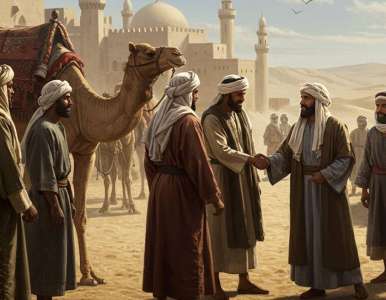We still, to this day and with much admiration, recite the poems of Al-Mutanabbi, including those he wrote in praise of Kafur al-Ikhshidi, then ruler of Egypt. But we ask ourselves: to what extent was the poet sincere and convinced of what he wrote in praise of that man? Or was it the emirate he aspired to gain from the Ikhshidi ruler that compelled him to compose such verses?
Perhaps Al-Mutanabbi did not wish to leave us in doubt over such questions, for he spared us the headache and confusion with his final poem about Kafur, a lampoon more bitter and more scathing than any other. In it, he advises us never to buy a slave unless accompanied by a stick, for slaves, as he claimed, are vile and wretched. And so we are still left wondering about Kafur’s true nature: was he the great man, or the wretched outcast? Perhaps he was neither. But can one truly penetrate the hearts of poets of kings and rulers, to know the sincerity of their feelings, the truth of their intentions, and whether they concealed what they revealed?
And what of Sayf al-Dawla al-Hamdanī, whom most of Al-Mutanabbi’s poems praised? Would history still carry his name today were it not for those poems? Without doubt, many poets wrote abundant praise of both rulers, but why have only Al-Mutanabbi’s verses endured—if not because he was a great creative genius?
There are similar tales in European history. It is said of the Medici family, who ruled Florence in the fifteenth century, that their greatest ruler was Lorenzo, known as Lorenzo the Magnificent. He lived in the time of Michelangelo, who created a number of statues for him that are still admired worldwide. Yet one statue did not please its patron, who told Michelangelo: This statue does not resemble me exactly. To which the proud artist replied: Two hundred years from now there will be no Lorenzo—only Michelangelo. He was pointing to the greatness and immortality of art.
Similarly, Beethoven composed his Third Symphony, the Eroica (Heroic), in praise of Napoleon Bonaparte after his military victories, inscribing in his own hand at the top of the score: Dedicated to the hero Napoleon Bonaparte. But when that military leader, once a symbol of heroism, crowned himself Emperor of France—not long after the revolution had toppled its monarchy—Beethoven was outraged. In anger and disillusionment, he erased Napoleon’s name from the score, leaving it dedicated instead to the heroic man. The hero was no longer Bonaparte, but anyone worthy of the title.
Examples are countless of literary works composed under the shadow of rulers. Many tales tell of a king, caliph, or monarch who, struck by sleeplessness or boredom, would summon the poets waiting at his gates to recite verses of praise, hoping to find relief from his weariness. Yet what remains of that vast rubble of cheap flattery—what we now call the literature of power?
The matter may have two sides. The first is positive in its outcome, though negative in its aim. For works of high artistic and literary value were indeed born of the talents of great creators, even though these masterpieces were made for rulers unworthy of them—and while the rulers are long gone, the works remain. After all, who would remember Kafur, Sayf al-Dawla, or Lorenzo without Al-Mutanabbi or Michelangelo? Would history remember Pharaohs Khufu, Khafra, and Menkaure without the pyramids that contain their mummies? Is it not strange that the tomb should be greater and more important than its occupant, even if he were a deified pharaoh? That the poem or the painting should outlast the king for whom it was made?
Who remembers the woman named Mumtaz? Yet the whole world gazes in awe at the Taj Mahal, the great work of art built to hold her remains.
The other face of the literature of power is the massive amount of mediocrity it produced: bad poetry, bad prose, and bad art by those without talent or taste, spread widely through newspapers, radio, and television. Napoleon Bonaparte was once asked why he kept near his court vagabonds of artists and poets though he was the great emperor. He replied: With a single decree I can make any beggar into a nobleman. But all the decrees of the world cannot create a true artist or poet of genius.
A poem attributed to a Soviet poet in Stalin’s era addresses his beloved:
For your eyes resemble the green steppes of our homeland.
Your stature is like the immortal Kremlin monument.
Your hair as abundant as the harvests of our collective farms.
And so I love you with a love nearly equal to my love for the General Secretary of our great Communist Party.
One doubts the authenticity of such a poem, but it reflects the atmosphere that hatched state-sponsored “literature of power,” made by those with no true talent, leaving behind nothing but noise, like doors banging in the wind.
Motasem Dalati
2007-07-26



